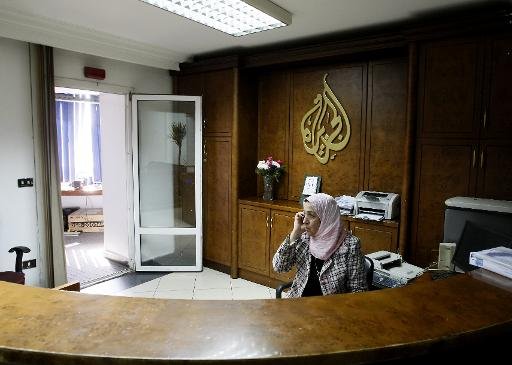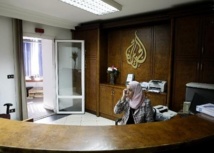The killing came a day after Egypt's top brass backed Field Marshal Abdel Fattah al-Sisi to run for the presidency, which he is expected to win easily if he does.
Sisi, 59, has said he would stand for the election to be held by mid-April if there was "popular demand".
"Vengeance is coming," Ansar Beit al-Maqdis said, addressing Sisi and interior minister Mohamed Ibrahim.
In just over six months, Sisi has won accolades from a vast section of Egyptians for ousting Islamist president Mohamed Morsi on July 3 and crushing his Muslim Brotherhood.
Morsi, Egypt's first elected civilian president, fell after mass protests following one turbulent year in office.
At least 1,400 people, mostly Morsi supporters, have been killed in a relentless crackdown on Islamists, according to Amnesty International, while scores of policemen and soldiers have fallen to militant attacks.
As part of the crackdown, 20 Al-Jazeera staff -- including award-winning Australian journalist Peter Greste, two Britons and a Dutch woman -- were referred to trial on Wednesday.
The authorities have been incensed by the network's coverage of their campaign against the Islamists and have accused the Qatari channel of ties to the Brotherhood.
The foreigners were accused of "airing false news aimed at informing the outside world that the country was witnessing a civil war", among other charges.
The remaining 16 -- all Egyptians -- were charged with belonging to a "terrorist" group.
Al-Jazeera said "these are silly charges and not based on any reality.
US State Department spokeswoman Jen Psaki also condemned the referral.
"The government's targeting of journalists and others on spurious claims is wrong and demonstrates an egregious disregard for the protection of basic rights and freedoms," she said.
A Sisi election victory would keep alive a tradition of presidents drawn from the military, but the road ahead is expected to be riddled with political turmoil and security challenges.
Jihadists threaten more attacks
The Brotherhood, now banned as a "terrorist" group, criticised the army's backing for Sisi.
"Now it is evident that what happened on July 3 was a full-fledged military coup," it said.
"The military council, whose main mission is to protect and not rule, mandated its chief, the leader of the coup, to run for the presidency, so the military can dominate political life in Egypt when it should remain far away from politics."
General Saeed's killing and later that of a police guard outside a Cairo church highlights the precarious security situation since the 2011 overthrow of veteran strongman Hosni Mubarak, with the violence having worsened since Morsi's removal.
On Wednesday, gunmen shot dead a policeman in the Nile Delta province of Sharkiya, security officials said.
At least 14 policemen have been killed across Egypt over the past week, while nine soldiers were killed in Sinai.
Sisi's supporters feel he is the only person capable of restoring stability in Egypt.
The interim leaders have even altered a roadmap for democratic transition by announcing the presidential election will be held before a legislative vote.
"I would have preferred a presidential election comprising civilian candidates to install a civilian democracy," said Alfred Raouf of the liberal Al-Dostour party.
"But I can understand that people want Sisi to be candidate, as given their security fears they want a strong man" to head the country.
Despite its rights record, Middle East peace Quartet representative Tony Blair said in an interview to Sky News Arabia that the military-installed government deserved the world's support.
"I think it's important the whole of the international community gets behind the leadership here and helps," the former British premier said after meeting Sisi and other top officials in Cairo Wednesday.
"The Muslim Brotherhood tried to take the country away from its basic values of hope and progress," he said.
Ansar Beit al-Maqdis vowed to target "the economic interests of the regime, which comprises the gas pipeline to Jordan that sends billions of Egyptian pounds in the pockets of Sisi and his generals."
It said it would "widen its economic war on (the) traitor clique until it defeats it".
The SITE Intelligence Group published a statement from one of its fighters, Abu Osama al-Masri, urging soldiers to mutiny and threatening them if they do not.
"We will target you as we target your commanders... and what is coming next is more cunning and more bitter."
-----------------------------------------------------------
Sisi, 59, has said he would stand for the election to be held by mid-April if there was "popular demand".
"Vengeance is coming," Ansar Beit al-Maqdis said, addressing Sisi and interior minister Mohamed Ibrahim.
In just over six months, Sisi has won accolades from a vast section of Egyptians for ousting Islamist president Mohamed Morsi on July 3 and crushing his Muslim Brotherhood.
Morsi, Egypt's first elected civilian president, fell after mass protests following one turbulent year in office.
At least 1,400 people, mostly Morsi supporters, have been killed in a relentless crackdown on Islamists, according to Amnesty International, while scores of policemen and soldiers have fallen to militant attacks.
As part of the crackdown, 20 Al-Jazeera staff -- including award-winning Australian journalist Peter Greste, two Britons and a Dutch woman -- were referred to trial on Wednesday.
The authorities have been incensed by the network's coverage of their campaign against the Islamists and have accused the Qatari channel of ties to the Brotherhood.
The foreigners were accused of "airing false news aimed at informing the outside world that the country was witnessing a civil war", among other charges.
The remaining 16 -- all Egyptians -- were charged with belonging to a "terrorist" group.
Al-Jazeera said "these are silly charges and not based on any reality.
US State Department spokeswoman Jen Psaki also condemned the referral.
"The government's targeting of journalists and others on spurious claims is wrong and demonstrates an egregious disregard for the protection of basic rights and freedoms," she said.
A Sisi election victory would keep alive a tradition of presidents drawn from the military, but the road ahead is expected to be riddled with political turmoil and security challenges.
Jihadists threaten more attacks
The Brotherhood, now banned as a "terrorist" group, criticised the army's backing for Sisi.
"Now it is evident that what happened on July 3 was a full-fledged military coup," it said.
"The military council, whose main mission is to protect and not rule, mandated its chief, the leader of the coup, to run for the presidency, so the military can dominate political life in Egypt when it should remain far away from politics."
General Saeed's killing and later that of a police guard outside a Cairo church highlights the precarious security situation since the 2011 overthrow of veteran strongman Hosni Mubarak, with the violence having worsened since Morsi's removal.
On Wednesday, gunmen shot dead a policeman in the Nile Delta province of Sharkiya, security officials said.
At least 14 policemen have been killed across Egypt over the past week, while nine soldiers were killed in Sinai.
Sisi's supporters feel he is the only person capable of restoring stability in Egypt.
The interim leaders have even altered a roadmap for democratic transition by announcing the presidential election will be held before a legislative vote.
"I would have preferred a presidential election comprising civilian candidates to install a civilian democracy," said Alfred Raouf of the liberal Al-Dostour party.
"But I can understand that people want Sisi to be candidate, as given their security fears they want a strong man" to head the country.
Despite its rights record, Middle East peace Quartet representative Tony Blair said in an interview to Sky News Arabia that the military-installed government deserved the world's support.
"I think it's important the whole of the international community gets behind the leadership here and helps," the former British premier said after meeting Sisi and other top officials in Cairo Wednesday.
"The Muslim Brotherhood tried to take the country away from its basic values of hope and progress," he said.
Ansar Beit al-Maqdis vowed to target "the economic interests of the regime, which comprises the gas pipeline to Jordan that sends billions of Egyptian pounds in the pockets of Sisi and his generals."
It said it would "widen its economic war on (the) traitor clique until it defeats it".
The SITE Intelligence Group published a statement from one of its fighters, Abu Osama al-Masri, urging soldiers to mutiny and threatening them if they do not.
"We will target you as we target your commanders... and what is coming next is more cunning and more bitter."
-----------------------------------------------------------









 Home
Home Politics
Politics











